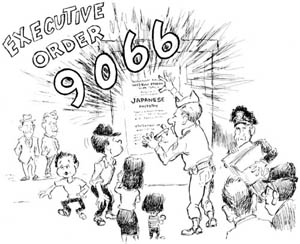
Mike's AP American blog
Monday, April 2, 2012
LAD Brown Vs. Board of Education
Linda Brown a black school girl had to walk 1mile across a railroad switch to her black school although there was a white school which was much closer. Her father tried to enroll her in the white school since it was closer but the principal refused Linda. Linda's father went to the NAACP and together many other families joined to fight the segregation of schools. Earl Warren said that the "separate but equal" doctrine was not fair and the desegregation of all schools was ordered. Except home schools of course.


Monday, March 12, 2012
LAD EXECUTIVE ORDER 9066
The executive order was a United States order during World War Two that was issued by FDR. The order gave the Secretary of War to make military zones, basically to make Japanese internment camps to protect America from and internal attack. America was in shock and fear after being sucker punched by the Japanese on Pearl Harbor. America had Germans living in America during the Great War but did no make internment camps because Germany never attacked America on its own soil. After Pearl Harbor FDR was ready to take every precaution to protect America.


LAD #34 FDR's Declaration of War
"A date that will live in infamy"-FDR. FDR spoke about how Japan had attacked America on its own soil out of no where with no warning. Innocent lives were lost and the American heart was struck. He also adresses the other islands and countries that Japan struck by sea and air. FDR said that Japan had decieved America, because despite its peaceful negotiations and peace talks with America it attacked, trying to cripple Americas navy. Trying to cripple Americas navy was a clear sign that Japan sought to wipe America out as being a threat. America had been attacked on its own soil and FDR wanted war.

Tuesday, March 6, 2012
LAD #33
FDR's first inaugural adress
After FDR took his oath into office as the 32nd president on March 4th 1933. FDR's innaugural adress was about 20minutes long. He adressed the economic issues, and placed the blame on bankers and buisnessmen. The said that the failure and result of the downfall of the economy was due to the greedy and immoral bankers and buisnessmen who only cared about their own profit. He than addressed the issue of unemployment which had reached a ridiculous 25percent. He said uit would be his most important and difficult task to fix the unemployment issue.

After FDR took his oath into office as the 32nd president on March 4th 1933. FDR's innaugural adress was about 20minutes long. He adressed the economic issues, and placed the blame on bankers and buisnessmen. The said that the failure and result of the downfall of the economy was due to the greedy and immoral bankers and buisnessmen who only cared about their own profit. He than addressed the issue of unemployment which had reached a ridiculous 25percent. He said uit would be his most important and difficult task to fix the unemployment issue.

Monday, March 5, 2012
LAD #32
Kellogg Briand Peace Pact
The Kellog Briand Peace Pact was a pact that was supposed to end American involvement in European "War" affairs. The pact was signed by many different nations such as America, France, Britain, Japan, Italy, Germany, and other nations. It was signed August 27 1928. The treaty basically outlawed war and formed a group of Nations that would try to be loyal to this pact.

The Kellog Briand Peace Pact was a pact that was supposed to end American involvement in European "War" affairs. The pact was signed by many different nations such as America, France, Britain, Japan, Italy, Germany, and other nations. It was signed August 27 1928. The treaty basically outlawed war and formed a group of Nations that would try to be loyal to this pact.

Sunday, February 12, 2012
LAD 31 Wilson's 14 points
Wilson's 14 points was a speech he addressed to a joint session of congress January 8th 1918. The purpose of the speech was to justify why America was in the war. The 14 points are-
1. No secret alliances between countries
2. Freedom of the seas in peace and war
3. Reduction of trade barriers between nations
4. Reduction of weapons and other arms
5. Colonial claim adjustments
6. Evacuation of Russian territory
7. Restoration of Belgian territories by Germany
8. Evacuation of all French territory
9. Adjustment of Italian boundaries
10. Independence for Austria and Hungary
11. Restoration of Balkan nations
12. Protection of minorities in Turkey and free passage through Dardanelles
13. Polish Independence, and access to the sea
14. League of Nations

1. No secret alliances between countries
2. Freedom of the seas in peace and war
3. Reduction of trade barriers between nations
4. Reduction of weapons and other arms
5. Colonial claim adjustments
6. Evacuation of Russian territory
7. Restoration of Belgian territories by Germany
8. Evacuation of all French territory
9. Adjustment of Italian boundaries
10. Independence for Austria and Hungary
11. Restoration of Balkan nations
12. Protection of minorities in Turkey and free passage through Dardanelles
13. Polish Independence, and access to the sea
14. League of Nations
LAD 30 Schenk V. United States
Schenck V. United states was a U.S. supreme court case, that involved the Espionage Act of 1917. The court was supposed to decide weather or not the defendant had the First Amendment (freedom of speech) against the draft for the Great War. The Supreme court decided that his conviction was constitutional, because of the "clear and present danger". The first amendment did grant freedom of speech but did not protect encouraging insubordination, especially during times of war.


Subscribe to:
Comments (Atom)